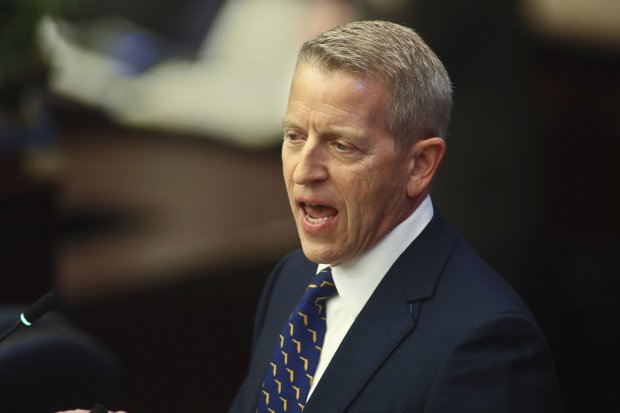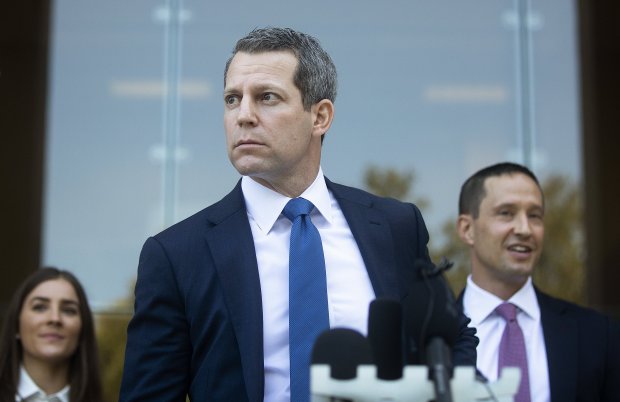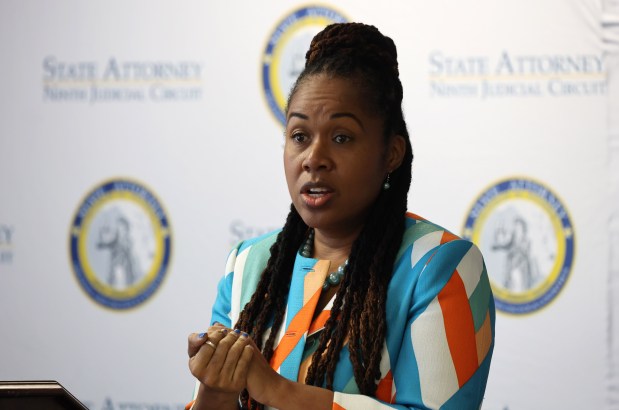A proposal by the Republican speaker of the Florida House to consolidate the state’s judicial circuits has drawn broad opposition from state attorneys across the political spectrum and others in the legal community, who say the change would be disruptive to the criminal justice system and deprive communities of local representation.
Detractors of the potential redrawing — including prosecutors hailing from across the state, from rural towns in the Panhandle and the Florida Keys to large cities like Orlando and Miami — in letters said they don’t want their circuits merged with others.
Many said it would be a cost-burdening disruption, requiring the sudden collaboration of disparate offices, including law enforcement, county clerks, public defenders, prosecutors, medical examiners and many other personnel.
They wrote about their circuit’s unique needs and challenges, which has led them to develop different fundamental processes and methods of relaying information since the circuits were divided into their current form over five decades ago.
The letters were written by 18 of the state’s 20 elected prosecutors for consideration by a committee weighing whether or not to recommend consolidation.
None of the state attorneys said they support consolidation; eleven stated outright in their letters that they do not support it; and while the others did not clearly state their position, they said their circuits and the communities within them are served efficiently as they are.
Melissa Nelson — the state attorney for Clay, Duval and Nassau counties — declined to write a letter because she is a member of the committee. Susan Lopez, the state attorney for Hillsborough County, also declined to write a letter, saying, “we will be working together with the agencies within our circuit to make information available to the assessment committee.”
Lopez, who is seeking reelection, was appointed by Gov. Ron DeSantis after he suspended former prosecutor Andrew Warren, a progressive Democrat whose ouster was criticized as political.
Each letter was collected by Jack Campbell, the president of the Florida Prosecuting Attorneys Association (FPAA), who sent them to the committee as a primer to lay out the current jurisdictions and criminal justice demands, as well as the differing community values in the counties that make up each circuit.
In an interview with the Orlando Sentinel, Campbell said the study “doesn’t concern” the FPAA, because “the system is working.” A radical redrawing of circuits, he said, would result in “a lot of cost, a lot of time, a lot of effort and a lot of disruption.”
“Despite the fact that we’ve had huge population growth in the state of Florida, we feel like we’re some of the most efficient and most accomplished prosecutors … and the taxpayers are getting an excellent return,” he said, adding: “I think that’s what anybody who looks at it will come up with.”
Renner urged review
In June, House Speaker Paul Renner in a letter to Florida Supreme Court Chief Justice Carlos G. Muñiz pushed for a formal review of the state’s current judicial circuit boundaries and the potential benefits of redrawing them.
Renner said he believes consolidation would lead to “substantial cost savings” to taxpayers and “might lead to greater efficiencies and uniformity in the judicial process, thereby increasing public trust and confidence.”

The state has been split into its 20 judicial circuits since 1969, when the population of Florida was 6.6 million, according to estimates from the U.S. Census Bureau. The state’s estimated population last year was 22.2 million.
In response to Renner’s request, the conservative-leaning Supreme Court put together the Judicial Circuit Assessment Committee to consider the issue; it must provide a recommendation to the court by Dec. 1.
The assessment committee had its first meeting in July.
At its second meeting Friday morning, committee members acting as liaisons for different professionals who would be affected by a redrawing, like state attorneys and judges, summarized the written and verbal comments they’d received from their counterparts. As made clear in the letters, there were overwhelming objections to the consolidation of judicial circuits.
Robert Lee, a Brevard County judge who is on the committee, said he heard comments from 20 of his colleagues at a recent conference of county court judges. Lee said each of the 20 judges “noted that there is no clear inefficiency or lack of uniformity, which might suggest the need to make changes.”
Lee said there was also a “big concern” from judges who work in smaller circuits about what they called “the diminishment of rural identity,” which they anticipate would come if their circuit was combined with a densely populated county.
Nelson, the state attorney serving on the committee, summarized the letters provided by Campbell, highlighting the common theme among as “disruption.” Most of the letters, she said, pointed out that no one has identified an issue related to efficiency, uniformity or effectiveness stemming from the current layout of judicial circuit boundaries.
Two other members of the committee, Laird Lile, who spoke with members of the Board of Governors of the Florida Bar, and Carlos Martinez, who met with the Florida Public Defender Association, reported similar concerns and a common sentiment that no change is needed when speaking about the comments they’ve received from their colleagues.
By the first week of November, the committee must finalize its findings and recommendations before it is reviewed, approved and then submitted to the Florida Supreme Court on Dec. 1.
The state’s highest court will certify its own findings and recommendations to the Florida Legislature, which will ultimately decide whether to reject or implement the Supreme Court’s recommendation.
The discussion around potentially lowering the number of circuits in Florida comes months after a sixth district appeals court was added.
The new appellate court’s creation was not supported by any of the DCA chief judges at the time or by any judge working at a district court, according to the past statements of former Supreme Court Justice Ricky Polston, the only dissenter in the court’s recommendation to the Legislature.

Democrats claim gerrymandering
Orange-Osceola State Attorney Monique Worrell and Warren, the former prosecutor, have expressed concern on social media about an effort to gerrymander Florida’s court system.
Last month, Warren wrote on Twitter that “Gerrymandering judicial circuits consolidates power in Tallahassee and takes it away from the people.”
“This could have a massive impact on who represents Floridians as state attorneys, public defenders [and] judges. Looks like another nail in democracy’s coffin.”
Warren was suspended by Gov. Ron DeSantis last year after he pledged not to prosecute those seeking or providing abortions or gender-affirming health care. His case seeking to be reinstated was thrown out in June by the Supreme Court, which found that Warren waited too long to file a petition.
Worrell in her own post included a screenshot of Warren’s Tweet and added, “IF YOU’RE NOT OUTRAGED YOU’RE NOT PAYING ATTENTION.”
Since the deadly Pine Hills shootings in February, Worrell, a Democrat, has faced fierce criticism from the governor, who she has accused of building a case against her to eventually justify her suspension.
She was not available for an interview to discuss the consolidation proposal by the time this story was published.
In her letter to the committee, Worrell said her district is unique for its inclusion of several densely populated attractions and facilities like Disney World, Orlando International Airport and the University of Central Florida.
“The amount of disruption that would be caused by consolidating processes, procedures … and other variables that differ circuit to circuit would be insurmountable,” Worrell wrote.
She added, “It would be impossible to add an additional population to an already significantly populated area, while also achieving minor ‘disruption and expense.’”

State Attorney Katherine Rundle, a Democrat whose circuit includes Miami-Dade County, made similar points, saying the redrawing would be “very disruptive to our law enforcement and our criminal justice systems.”
“Like education, law enforcement is, and should be, local and reflect community values; judicial circuit consolidation would serve neither of those two ideals,” she said.
‘If it ain’t broke don’t fix it’
Republican state attorneys who urged against consolidation said it would do more harm than good.
State Attorney Ed Brodsky, whose circuit includes Sarasota, Manatee and DeSoto counties, said reducing the number of judicial circuits is “counterintuitive” and “would lead to an overall increase in crime and fiscal costs to the citizens and future victims in our state.”
Larry Basford – state attorney for Bay, Calhoun, Gulf, Holmes, Jackson and Washington counties – said consolidation “would only cause unnecessary confusion for the entities we work with and the public we are devoted to serve.”
State Attorney Dennis Ward, whose circuit encompasses Monroe County and the Florida Keys, said merging his circuit with any others would threaten to disrupt “residents’ access to justice.”
Brevard-Seminole State Attorney Phil Archer touted a low crime rate in his circuit and others across the state as evidence that Florida’s judicial system is well functioning.
“We are at 50-year lows! That does not happen by chance,” he said. “The reputation and standards for success that we have established within this Circuit was not built overnight. It is crucial that we maintain the integrity of our Circuit.”
State Attorney Thomas Bakkedahl – who serves Indian River, Martin, Okeechobee and St. Lucie counties – said consolidation “would only serve to dilute the quality and positive impact of these hard-won relationships [among local offices].”
“This exercise brings to mind the old adage ‘if it ain’t broke don’t fix it,’” Bakkedahl said.
Some judges also opposed
Several judges have also written or signed letters against the consolidation of the state’s judicial circuits.
Hillsborough County Judge Frances Perrone, in a letter signed by several of her colleagues, wrote that consolidation would cause “confusion” and a “breakdown in the confidence of the system of justice, strain on our branch of government and other myriad of problems bound to occur by the upheaval of the current judicial boundaries.”
The letter noted that judges’ elections would be impacted, especially for circuit trial judges from smaller counties who would “face a Goliath opponent from a candidate in a larger county with a reputation in a broader, more densely populated community.”
Erika Quartermaine, a Sarasota County judge, said she was “troubled” by Renner’s letter, adding that she’s “unaware of the inefficiencies and lack of uniformity to which he refers.”
Quartermaine noted that in his letter, Renner mentioned the 11th and 16th circuits – which cover Miami and the Florida Keys, respectively – as areas that would benefit from consolidation.
“Having lived and worked in Miami and spent a great deal of time in the Keys, they are worlds apart,” Quartermaine said.
“Clumping them together is simply wrong,” she added. “Other than a border and a tropical breeze, those geographic territories have very little in common.”
The judge cited a concern shared by some current and former elected prosecutors – an effort to redraw the court circuits would lower the number of elected officials.
“If we consolidate circuits, it would necessarily consolidate power in the hands of fewer people,” Quartermaine said.
“A connection to the community is one of the greatest attributes a judge, state attorney, a public defender, or other public sector representative can have,” she said. “The decentralization of power provides a check on abuses of power and that is crucial when the rights and liberties of our fellow citizens are at issue.”
ccann@orlandosentinel.com
This post was originally published on this site be sure to check out more of their content.








